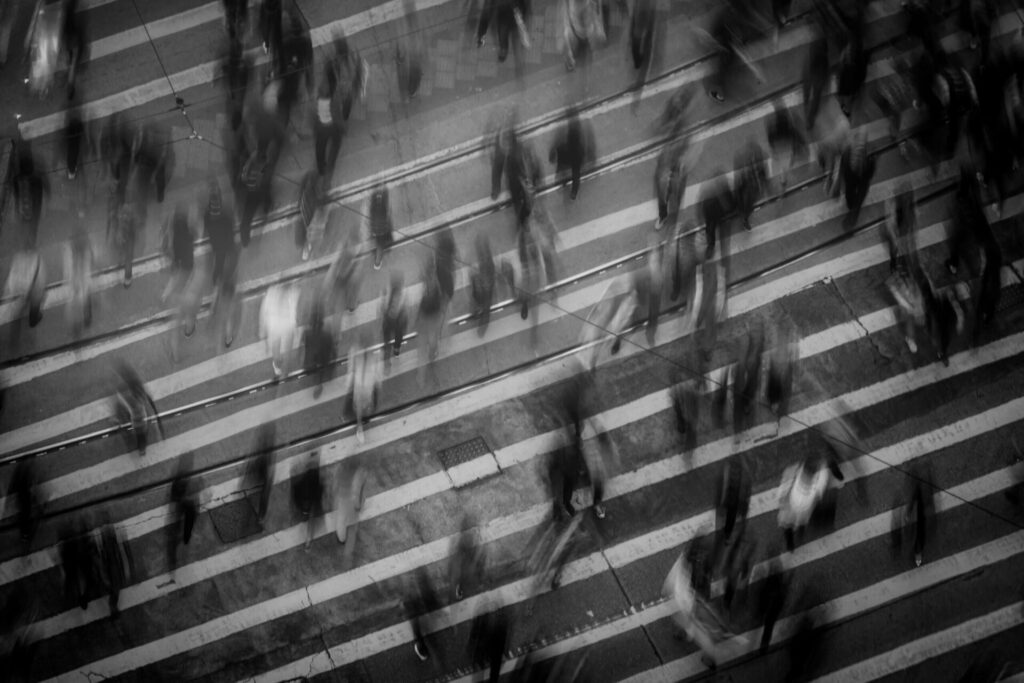Everyone can invest in a society that favors dialogue and the peaceful resolution of conflicts. Schools and civil society play a determining role in raising awareness, reconciling collective memory, cultivating democracy and cooperation between individuals, communities and States.

Au sein de nos démocraties, chacun·e peut contribuer à construire la paix et encourager les citoyen·ne·s à pratiquer l’écoute et le dialogue démocratique, que ce soit au sein d’une famille, d’un quartier, d’une association, d’une école ou d’une communauté plus large. L’Histoire montre qu’une plus grande participation démocratique diminue la probabilité que les sociétés résolvent les conflits par la violence et la guerre. Or, la paix et la démocratie se construisent à tous les échelons de la société !
In Europe, since the end of the Second World War, States and civil society have been able to build and invest in institutions – local, national and international – to develop democracy, cooperation, mediation and peaceful and legal processes of conflict resolution.
However, peace is never guaranteed and we must constantly act on all available levers to maintain dialogue. This is why the United Nations General Assembly adopted, on January 15, 1998, the notion of “culture of peace”: “The culture of peace is a set of values, attitudes, behaviors and ways of life that reject violence and prevent conflicts by addressing their roots through dialogue and negotiation between individuals, groups and States” .
Today, the geopolitical balance is confronted with a global war in Ukraine and a reconfiguration of alliances between powers. In a fragile context, international organizations created to prevent conflicts – such as the UN – must imagine new models of cooperation between States to build a new balance favorable to peace (read the portrait of Pierre Hazan below in this number).
If we, as simple citizens, may feel overwhelmed – and even frightened – by the war in Ukraine, it is essential to remember that everyone can act at their own level to build peace. at the heart of our society.
“It is essential to remember that everyone can act at their own level to build peace at the heart of our society. »
School can develop essential skills
En France, le célèbre neuropsychiatre Boris Cyrulnik a récemment publié un ouvrage où il identifie le manque affectif chez l’enfant comme facteur de la violence des adultes[1]. Il plaide dès lors pour enseigner l’empathie à l’école pour prévenir la violence à l’échelle d’une société.
L’espace éducatif constitue en effet un vecteur d’émancipation, où les élèves et les enseignant·es deviennent des agent·es de changement, en prenant conscience des iniquités et des préjugés passés et présents. Il s’agit d’aider les élèves à analyser et transformer leur vision du monde, définie par des influences culturelles, familiales, historiques, religieuses et sociétales, afin de construire une nouvelle vision commune et partagée avec les autres élèves.
Let us emphasize from the outset that the school is an institution of our society and, as such, often reproduces its inequalities, its discrimination, its conflicts of values and even its social violence: school harassment, vandalism, conflicts between students and teachers. , lack of public resources, exhaustion of the teaching staff, etc.
But there is no shortage of goodwill and educational tools to meet the challenge: discussion groups to defuse situations of harassment, working groups to improve “living together” in the class and school, positive impetus from management of the establishment, …
With these tools and assets, the school can therefore help children to first know themselves, to appreciate themselves, to understand and to consider with sympathy the notions of justice, equality, freedom, tolerance, of democracy and make them want to work for a more humane, more united world.
To achieve this, schools must develop the capacity to recognize and accept the values required for common life, and to appreciate other cultures; the ability to dialogue and modify one's judgment; ability to resolve conflicts constructively[2].
“The school can develop the ability to dialogue and modify its judgment; abilities to resolve conflicts constructively.”
A model program in New York
The City of New York has implemented a project that is now a benchmark: the Creative Conflict Resolution Program (RCCP), funded by New York public schools and by an independent non-profit organization.[3]. He understands :
- A program of study, from kindergarten to the beginning of secondary school, which consists of teaching several key techniques such as active listening, assertiveness, cooperation, recognition of diversity, critical thinking... skills practiced in particular through role play and group discussion, ensuring participation and interactivity.
- Continuing training and ongoing technical assistance for teachers.
- A mediation program provided by the students: in the event of a conflict in the playground, for example, students wearing a “mediator” vest offer to find a solution together.
- Training for parents who are called upon to lead, in turn, workshops intended for other parents.
- Training of administrative staff, so that, in the exercise of their functions, they promote the implementation of the program
Note that in Europe, schools with active pedagogy often implement participatory conflict mediation processes.
“In Belgium, many popular education and continuing education actors raise awareness and mobilize citizens for democracy, social justice, solidarity and peace. »
Continuing education in action
Beyond schools, all of civil society also plays a determining role in building peace at the heart of our society. In Belgium, many popular education and continuing education actors raise awareness and mobilize citizens for democracy, social justice, solidarity and peace. Associations – such as Justice & Peace – develop educational tools that allow actors in society to address, in public, the challenges of a fairer world.
Also, actors from the cultural world stage our Humanity in images, in music, in text, in shows, etc. to open our senses and our emotions to a common, desirable and peaceful imagination.
The immigrantsꞏthey share the values of their host country
“Les immigréꞏes partagent les valeurs dominantes de leur pays d’accueil”, révèle une large enquête menée dans 35 pays européens entre 2017 et 2020, portant sur le sens que les individus donnent à la famille, au travail, aux loisirs, aux relations à autrui, à la religion et à la politique[4].
The political scientist Bernard Denni, who participated in this sociological survey, summarizes the conclusions:
“Le brassage des normes et des valeurs entre autochtones, immigréꞏes and foreigners, against a backdrop of social inequalities, is not always a smooth river and generates inevitable tensions. But these analyzes do not reveal any divides between the values of natives and those of immigrants justifying a feeling of threat.[5].
Indeed, people of foreign origin and natives share traditional values in the East and South of Europe, and values of personal emancipation in the North and West of Europe.
« Les politiques d’immigration devraient favoriser davantage ces ressorts sociologiques par lesquels les immigrés deviennent des Européens comme les autres.”, conclut Bernard Denni.
In reality, xenophobic speeches (“Immigrants represent a threat”), used by far-right parties, taken up by right-wing parties and over-publicized by certain media, aim to create a climate of fear and a political divide to capture the electoral votes of citizens who feel downgraded and precarious in a society lacking reference points. To build peace and maintain social cohesion, it is therefore, more than ever, a question of investing in education, social justice and solidarity within an inclusive project for the benefit of all citizens.
L’amitié, vectrice de paix ?
De l’Antiquité à aujourd’hui, l’amitié a joué différents rôles au sein de nos sociétés. Aux yeux des Grecs anciens, l’amitié était le principe qui tenait ensemble les sociétés, voire l’Univers entier. Durant les périodes troubles, de l’époque romaine au Moyen-Âge, l’amitié était politique : les seigneurs et notables devaient trouver des alliées de confiance pour exercer le pouvoir.
Les gestes d’amitié se sont codifiés. À l’origine, se serrer la main démontrait à son interlocuteur·rice que l’on ne tenait pas une arme cachée dans sa main.
In our contemporary societies, where old social structures (couple, family, professional relationships, neighborhood relationships, parties, unions, etc.) are weakened, friendship now embodies a private, lasting and reliable relationship, on which we can count on over the course of time. of life.
Mais l’amitié a aussi un effet civilisateur, comme rempart à la violence et à l’extrémisme. Selon une étude suédoise, les personnes qui font l’expérience du rejet et de l’exclusion dans leur vie quotidienne se montrent plus enclines à rejoindre des groupes radicaux. Une récente étude suisse montre également que les personnes les moins satisfaites de leurs amitiés, ou qui souffrent de solitude, justifient beaucoup plus facilement la violence pour lutter contre les injustices ou défendre leurs convictions[6].
À l’inverse, l’étude montre que l’amitié incite à s’engager socialement et joue dès lors un rôle bénéfique pour la communauté. Dans ce contexte, la philologue Ivy Schweitzer désigne l’amitié comme une « pratique civile démocratique ».
Christophe Haveaux.
[1] “Quarante voleurs en carence affective”, Boris Cyrulnik, septembre 2023, éditions Odile Jacob.
[2] “L’éducation à la paix, pourquoi, comment, le rôle de l’école”, Saliou Sarr, professeur, formateur, président de l’EIP/Sénégal et membre de l’équipe pédagogique du CIFEDHOP (Centre International de Formation à l’enseignement des droits de l’homme et de la paix de Genève , Suisse).
[3] “The Resolving Conflict Creatively Program: How We Know It Works”, Jennifer Selfridge
[4] European Values Study: https://europeanvaluesstudy.eu
[5] Le Monde, 08/28/2023[6] Study available here: https://engagement·migros·ch/fr > News and projects > Live together > Friendship under the microscope. Direct link: https://engagement·migros·ch/fr/news-projets/vivre-ensemble/etude-sur-l-amitie





